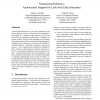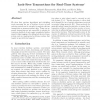105 search results - page 1 / 21 » Supporting lock-free composition of concurrent data objects |
ISCA
1993
IEEE
13 years 8 months ago
1993
IEEE
A shared data structure is lock-free if its operations do not require mutual exclusion. If one process is interrupted in the middle of an operation, other processes will not be pr...
RTDB
1996
13 years 5 months ago
1996
We show that previous algorithmic and scheduling work concerning the use of lock-free objects in hard real-timesystems can be extended to support real-time transactions on memory-...
CF
2010
ACM
13 years 2 months ago
2010
ACM
Lock-free data objects offer several advantages over their blocking counterparts, such as being immune to deadlocks and convoying and, more importantly, being highly concurrent. H...
IPPS
1996
IEEE
13 years 8 months ago
1996
IEEE
In many concurrent programming languages programs are difficult to extend and modify. This is because changes in a concurrent program (either through modification or extension) re...
ICCL
1994
IEEE
13 years 8 months ago
1994
IEEE
This paper presents a model of concurrent objectoriented programming in which specification of computational behavior is separated from specification of interaction behavior of me...



